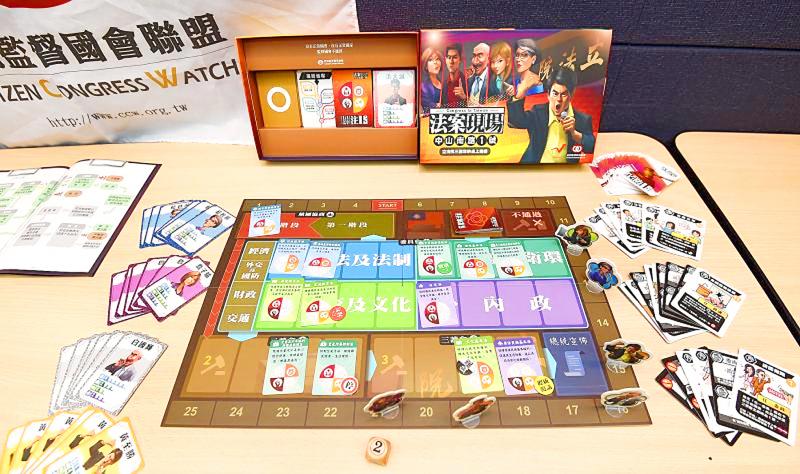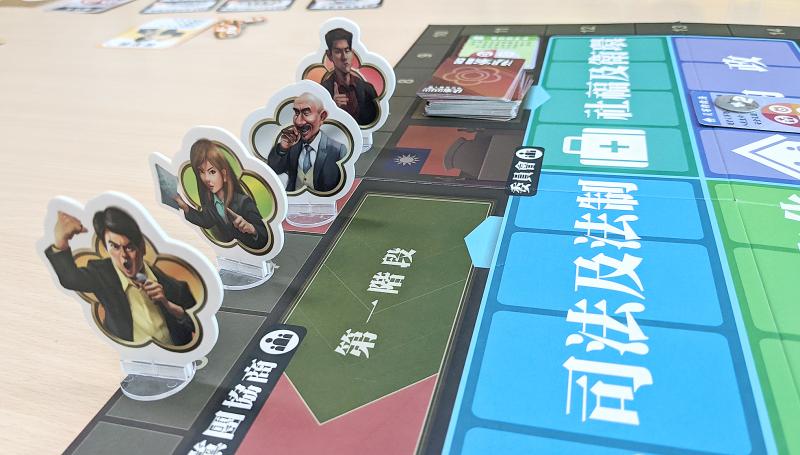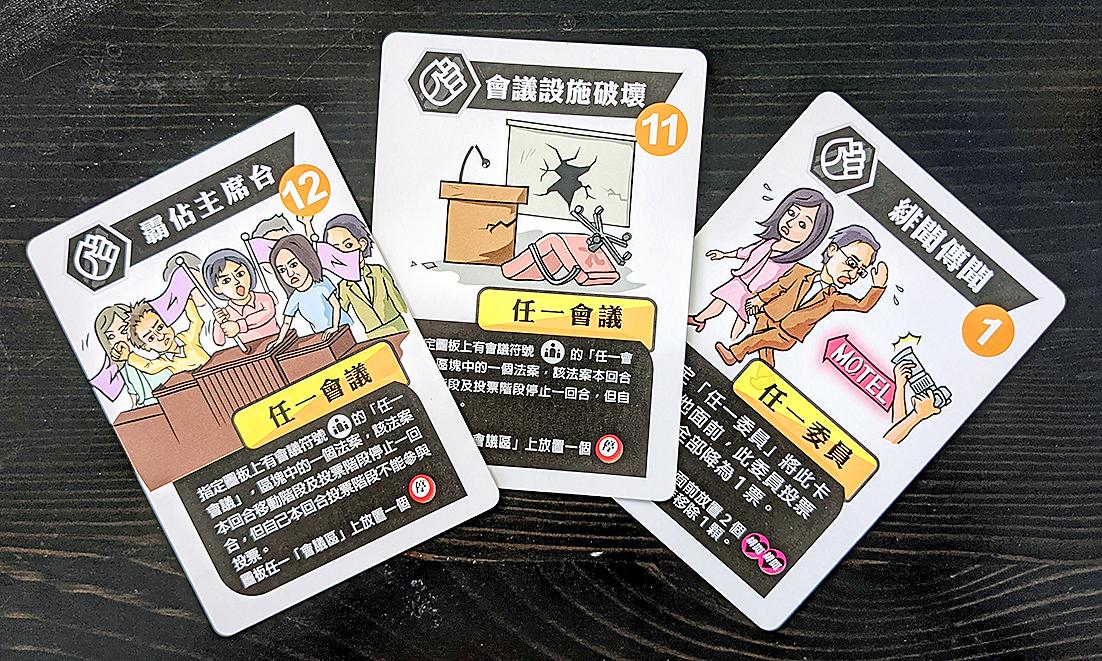There are no pig guts for me to throw in the legislative board game No. 1 Zhongshan S Road: The Scene of A Bill (中山南路一號 : 法案現場), so I trash the meeting room to delay the progress of a draft act I don’t like.
Such is real life in the nation’s cutthroat lawmaking battlegrounds, and this sort of sabotage happens more often than one thinks — just two weeks ago, opposition Chinese Nationalist Party (KMT) members smashed up the speaker’s podium to prevent Premier Su Chen-Chang (蘇貞昌) from delivering his policy report.
My wiley opponent is ready, however, and has switched meeting rooms ahead of time. So I hit him with a sex scandal where he’s photographed leaving a motel with a female colleague, which limits his ability to vote on bills until the public eventually forgets about his transgressions. He can hold a press conference to clear his name, but he doesn’t have the right card.

Photo courtesy of Citizen’s Congress Watch.
All this time, however, I’m working to block a bill that promotes gender equality, something that I would definitely not support in real life. But my party, or my character — who may or may not resemble a certain politician — does not gain much from supporting the issue. So I must shoot it down.
This is the juicy side of the Legislative Yuan that the public is more familiar with, but these extreme or backhanded actions are just one portion of the arsenal lawmakers rely on to further their agenda. For much of the time, I’m making actions such as “amending a motion” or “requesting a public hearing” to keep the bill in second reading, or rallying public support and launching petitions. That’s the real meat of the process, and is what the game aims to educate its players about.
ACCURATE SIMULATION

Photo: Liao Chen-hui, Taipei Times
After two years of fundraising and testing, legislative watchdog group Citizen’s Congress Watch finally released the game on Sept. 29, developed in conjunction with Soochow University’s (東吳大學) Legislative Research Center. While we hear about the legislature constantly in the news, the game is quite illuminating and, according to the legislators who tried it, an accurate simulation of the immense bureaucracy and political maneuvering that goes into passing a law.
The game is targeted at high school and university students, and Citizen’s Congress Watch staff have been holding sessions during civics classes as well as other events. Unfortunately it is only in Chinese, as it would be very beneficial to English-speakers who often feel bewildered by what’s going on in those chambers as well.
It was very helpful that the group sent several staff members to the Taipei Times’ office to explain the game and conduct an hour-long session, and like any quality board game it takes the entire hour and a few rounds to barely start settling into things. But the brief exposure already enhanced my basic understanding of how the legislature works.

Photo: Han Cheung, Taipei Times
Unless I’m extremely vested in a bill, I seldom follow its progress from start to finish. And when I do, I’m more interested in the issue and debates (and shenanigans) that ensue rather than the process itself. But sometimes I wonder how some bills get bogged down and stall only to resurface from time to time, while others get passed shortly after they’re brought up. I still don’t know what all of the terms in the game mean after just one session, but I’ve been noticing them more as I browse the news.
But most importantly, the game is enjoyable and quite competitive. The catch is that players are not aware of each other’s political inclinations, and they cannot see their actions on each bill, leading to a lot of guessing and observing. This part may not be as realistic, but it definitely adds another layer to the otherwise straight-up gameplay.
While I would like to have seen more outrageous antics — for example, there isn’t a card that allows me to physically assault my rivals, which is a time-honored tradition in Taiwan’s legislature — it’s still a highly effective means to make an often tedious subject fun.

Photo: Han Cheung, Taipei Times

In the March 9 edition of the Taipei Times a piece by Ninon Godefroy ran with the headine “The quiet, gentle rhythm of Taiwan.” It started with the line “Taiwan is a small, humble place. There is no Eiffel Tower, no pyramids — no singular attraction that draws the world’s attention.” I laughed out loud at that. This was out of no disrespect for the author or the piece, which made some interesting analogies and good points about how both Din Tai Fung’s and Taiwan Semiconductor Manufacturing Co’s (TSMC, 台積電) meticulous attention to detail and quality are not quite up to

April 21 to April 27 Hsieh Er’s (謝娥) political fortunes were rising fast after she got out of jail and joined the Chinese Nationalist Party (KMT) in December 1945. Not only did she hold key positions in various committees, she was elected the only woman on the Taipei City Council and headed to Nanjing in 1946 as the sole Taiwanese female representative to the National Constituent Assembly. With the support of first lady Soong May-ling (宋美齡), she started the Taipei Women’s Association and Taiwan Provincial Women’s Association, where she

Chinese Nationalist Party (KMT) Chairman Eric Chu (朱立倫) hatched a bold plan to charge forward and seize the initiative when he held a protest in front of the Taipei City Prosecutors’ Office. Though risky, because illegal, its success would help tackle at least six problems facing both himself and the KMT. What he did not see coming was Taipei Mayor Chiang Wan-an (將萬安) tripping him up out of the gate. In spite of Chu being the most consequential and successful KMT chairman since the early 2010s — arguably saving the party from financial ruin and restoring its electoral viability —

It is one of the more remarkable facts of Taiwan history that it was never occupied or claimed by any of the numerous kingdoms of southern China — Han or otherwise — that lay just across the water from it. None of their brilliant ministers ever discovered that Taiwan was a “core interest” of the state whose annexation was “inevitable.” As Paul Kua notes in an excellent monograph laying out how the Portuguese gave Taiwan the name “Formosa,” the first Europeans to express an interest in occupying Taiwan were the Spanish. Tonio Andrade in his seminal work, How Taiwan Became Chinese,